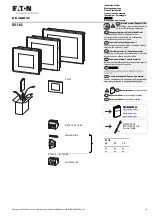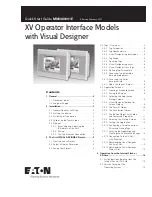
– 4 –
– 5 –
– 6 –
www.moxa.com/support
The Americas: +1-714-528-6777 (toll-free: 1-888-669-2872)
Europe: +49-89-3 70 03 99-0
Asia-Pacific: +886-2-8919-1230
China: +86-21-5258-9955 (toll-free: 800-820-5036)
2015 Moxa Inc. All rights reserved.
VESA Mounting
The MPC-2190 may also come with an optional VESA mounting kit.
Six flat screws and four round screws are required to fasten the
VESA mounting bracket. See the figure below for detailed screw
specifications and torque values.
An additional four screws (not included in the kit) are required to
mount the computer on a VESA rack. For this purpose, use M6
screws with a length between 10 and 12 mm.
4.
Connector Description
Extending the Display
The MPC-2190 comes with both standard VGA (DB15) and DVI-D
(DB29) interfaces (located on the bottom of the shell) which may
be used to simultaneously extend the
display across two monitors.
Connecting to a Keyboard and Mouse
The MPC-2190 Series comes with two PS/2
connectors located on the bottom surface,
for connecting a keyboard and a mouse.
Serial Ports
The MPC-2190 offers two software-selectable RS-232/422/485
serial ports over a DB9 connector. Refer to the MPC-2190 User’s
Manual for the details on serial port configuration. The pin
assignments for the ports are shown in the following table:
Pin RS-232 RS-422 RS-485
(4-wire)
RS-485
(2-wire)
1
DCD
TxDA(-) TxDA(-) –
2
RxD
TxDB(+) TxDB(+) –
3
TxD
RxDB(+) RxDB(+) DataB(+)
4
DTR
RxDA(-) RxDA(-) DataA(-)
5
GND
GND
GND
GND
6
DSR
–
–
–
7
RTS
–
–
–
8
CTS
–
–
–
Ethernet Ports
The pin assignments for the two Fast Ethernet 100/1000 Mbps
RJ45 ports are shown in the following table:
Pin
100 Mbps
1000 Mbps
1
ETx+
TRD(0)+
2
ETx-
TRD(0)-
3
ERx+
TRD(1)+
4
–
TRD(2)+
5
–
TRD(2)-
6
ERx-
TRD(1)-
7
–
TRD(3)+
8
–
TRD(3)-
Refer to the following table for a description of the LAN indicators:
LAN
(on connectors)
Green
100 Mbps Ethernet mode
Yellow
1000 Mbps (Gigabit) Ethernet mode
Off
No activity / 10 Mbps Ethernet mode
NMEA Ports
The MPC-2190 comes with eight NMEA
ports on the bottom surface. The pin
assignments are shown in the figure at
right.
Audio Interface
The MPC-2190 comes with line-in and
line-out audio jacks, allowing users to
connect a speaker system, an earphone,
or a microphone.
USB Ports
Four USB 2.0 ports are available on the bottom surface. Use these
ports to connect mass storage drives and other peripherals.
HDD Installation Brackets
The MPC-2190 comes with two storage drive installation brackets
where a 2.5” SATA mass storage drive may be installed. Refer to
the hardware manual for detailed installation instructions.
Real Time Clock
The real time clock (RTC) is powered by a lithium battery. We
strongly recommend that you do not replace the lithium battery
without help from a qualified Moxa support engineer. If you need
to change the battery, contact the Moxa RMA service team at
http://www.moxa.com/rma/about_rma.aspx
.
ATTENTION
There is a risk of explosion if the clock’s lithium battery is
replaced with an incompatible battery.
5.
Powering on/off the MPC-2190
To power on the panel computer you may either connect power by
connecting the Terminal Block to Power Jack Converter to the
terminal block and then connect a power adapter, or you may
connect the computer to an AC power source using the power cord.
After the power source is connected, touch the Menu button to
turn the computer on. it takes about 10 to 30 seconds for the
system to boot up.
To power off the MPC-2190 Series, touch the MENU button for 4
seconds; depending on your OS’s power management settings you
may enter standby, hibernation, or system shutdown mode. If
you encounter technical problems, touch and hold the MENU
button for 10 seconds to force a hard shutdown of the system.
Grounding the MPC-2190 Series
Proper grounding and wire routing help to limit the effects of noise
from electromagnetic interference (EMI). Run the ground
connection from the ground screw to the grounding surface prior to
connecting the power source.




















